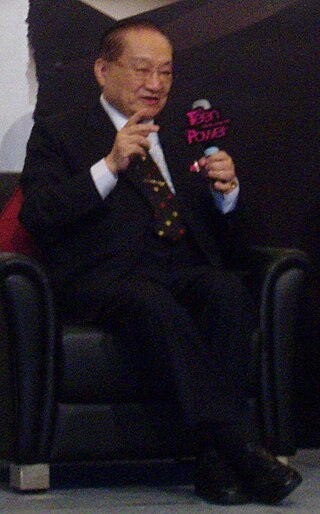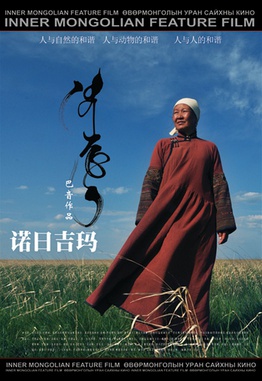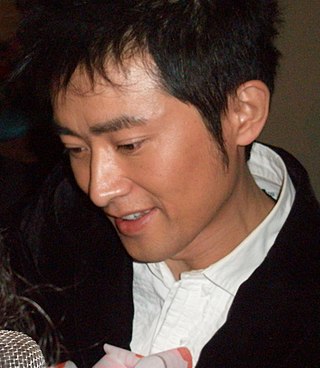Related Research Articles

Louis Cha Leung-yung, better known by his pen name Jin Yong, was a Hong Kong wuxia novelist. He was Hong Kong's most famous author and the newspaper Ming Pao's co-founder and first editor-in-chief. Cha has been named along with Gu Long and Liang Yusheng as the "Three Legs of the Tripod of Wuxia". He has also been known as one of the "Four Great Talents of Hong Kong".

The Legend of the Condor Heroes is a wuxia novel by Chinese writer Jin Yong. It is the first part of the Condor Trilogy and is followed by The Return of the Condor Heroes and The Heaven Sword and Dragon Saber. It was first serialised between 1 January 1957 and 19 May 1959 in Hong Kong Commercial Daily. Jin Yong revised the novel twice, first in the 1970s and later in the 2000s. The English title is imprecise since neither species of the condor, the Andean condor and Californian condor, is native to China.
Wei Zi is a Chinese film and television actor.
The Bayin-Gobi Formation is a geological formation in Inner Mongolia, north China, whose strata date back to Albian of the Early Cretaceous period. Dinosaur remains are among the fossils that have been recovered from the formation.

Fan Wei is a Chinese actor known for his roles in Chinese sketch comedies, sitcoms, and films. He gained fame through performances with Zhao Benshan and Gao Xiumin in CCTV New Year's Galas since 1995. In recent years, he has been featured in such films as Cell Phone, A World Without Thieves, If You Are the One and City of Life and Death. He has also acted in several television series produced in mainland China such as Ma Dashuai (2003-2006) and The Long Season (2023).

Zhang Hanyu is a Chinese actor. He is known for starring in the films Assembly (2007), The Message (2009), The Chef, the Actor, the Scoundrel (2013), The Taking of Tiger Mountain (2014), Operation Mekong (2016), The Captain (2019), and Chinese Doctors (2021), as well as the television series All Men Are Brothers (2011).
Bayanqolu is a Chinese politician of Mongol ethnicity. He served as the Chinese Communist Party Committee Secretary of Jilin Province from 2014 to 2020 and the Governor of Jilin from 2012 to 2014; Bayanqolu was, at the time of his appointment, the only ethnic-minority official serving as a provincial-level Party Secretary.
Jin Yaqin, also known by her stage name Bai Wei, was a Chinese actress.
Naren Hua is a Chinese film and television actress of Mongolian ethnicity.
Charging Out Amazon is a 2002 Chinese action film directed by Song Yeming and written by Zhao Junfang and Wang Gehong, the film stars Hou Yong, Mu Lixin, and Tom Butler. The film was produced by August First Film Studio and CCTV-6. It was released in China on July 1, 2002. Charging Out Amazon received mixed to positive reviews and was a box office success. The film won Best Ornamental Effect Award from Beijing College Student Film Festival, four awards from Huabiao Awards, and three awards from Golden Rooster Awards and was nominated for Best Recording.
Badema is a Chinese actress and singer of Mongolian ethnicity best known for her role in Norjmaa, which earned her a Best Actress Award in the 30th Golden Rooster Awards.

Norjmaa is a 2014 Chinese film directed by Bayin. Norjmaa won Best Film Award and Best Actress Award at 33rd Fajr International Film Festival (2015), Best Actress Award and Best Cinematographer Award at Yakutsk International Film Festival (2015), Best Actress Award at Golden Rooster Awards (2015).

Pema Tseden, also called Wanma Caidan was a Chinese Tibetan film director and screenwriter. He was a professor at the China Academy of Art in Hangzhou and a member of the Film Directors Guild of China, China Film Association, and Chinese Film Literature Association. He is known for making many films entirely in Tibetan language and presenting a more realistic depiction of Tibetan life as opposed to the exoticism often associated with the region.
The 12th Beijing College Student Film Festival took place in Beijing, China in May 2005. Kekexili: Mountain Patrol was the biggest winner, receiving two awards, including Best Director and Grand Prix Award. Xia Yu won Best Actor for his performance in Waiting Alone, and Zhang Jingchu for her role in Huayao Bride In Shangri-la. Golden Rooster-winner Lu Chuan's Kekexili: Mountain Patrol won Best Director Award, and A Story of Dun Zi was declared Best Film Award.
Zhang Yi is a Chinese actor best known for his roles in films Dearest, Cock and Bull and Operation Red Sea and television series Soldiers Sortie, My Chief and My Regiment and The Knockout.

Yong Mei is a Chinese actress. In 2019, she won the Silver Bear for Best Actress at the 69th Berlin International Film Festival for her performance in the film So Long, My Son directed by Wang Xiaoshuai.
Zheng Guo'en was a Chinese film theorist, cinematographer, director, and educator. A longtime professor at Beijing Film Academy, he trained many prominent Chinese filmmakers including Zhang Yimou. He received the Lifetime Achievement Award at the 27th Golden Rooster and Hundred Flowers Film Festival in 2018.

Yan Qingyu is a Chinese actress best known for her roles in Divorce Contract (1990), Keeping Moon at Heart (2000), The Heaven Sword and Dragon Saber (2003) and The Demi-Gods and Semi-Devils (2013).

Ren Quan is a Chinese actor, investor and businessman. One of his most prominent roles was as Gongsun Ce in Young Justice Bao and its sequel Young Justice Bao II, alongside Zhou Jie, Li Bingbing and Lu Yi. Other notable credits include All the Misfortunes Caused by the Angel and The Nation Under The Foot.
Wen Muye is a Chinese film director best known for his comedy-drama film Dying to Survive (2019).
References
- 1 2 人物小传:巴音额日乐. Metime (in Chinese). 2012.
- 1 2 3 4 5 巴音额日乐:为电影而生. northnews.cn (in Chinese). 2014-06-10.
- ↑ 导演巴音靠自然征服评委. GMW.cn (in Chinese). 2015-09-20.
- ↑ 《诺日吉玛》获伊朗国际电影节大奖. northnews.cn (in Chinese). 2015-06-05. Archived from the original on 2015-09-28. Retrieved 2015-09-28.
- ↑ 【壮丽70年·奋斗新时代】影坛伉俪巴音、巴德玛—— 为内蒙古民族电影事业 努力奉献传佳话. hhhtnews.com (in Chinese). 17 July 2019. Retrieved 13 September 2019.
- ↑ 巴德玛 “半路出家”实至名归. Sohu (in Chinese). 23 September 2015. Retrieved 26 September 2015.